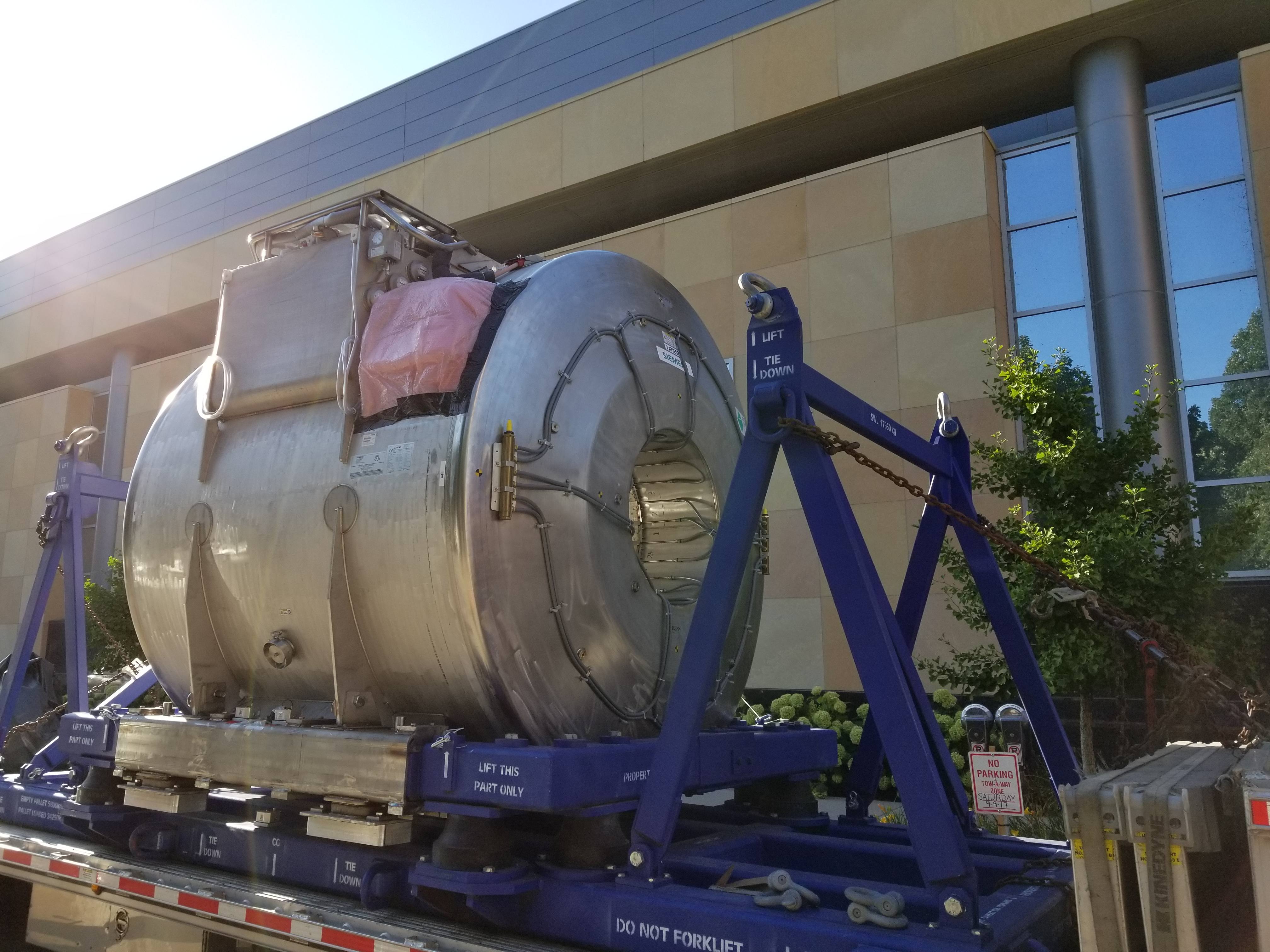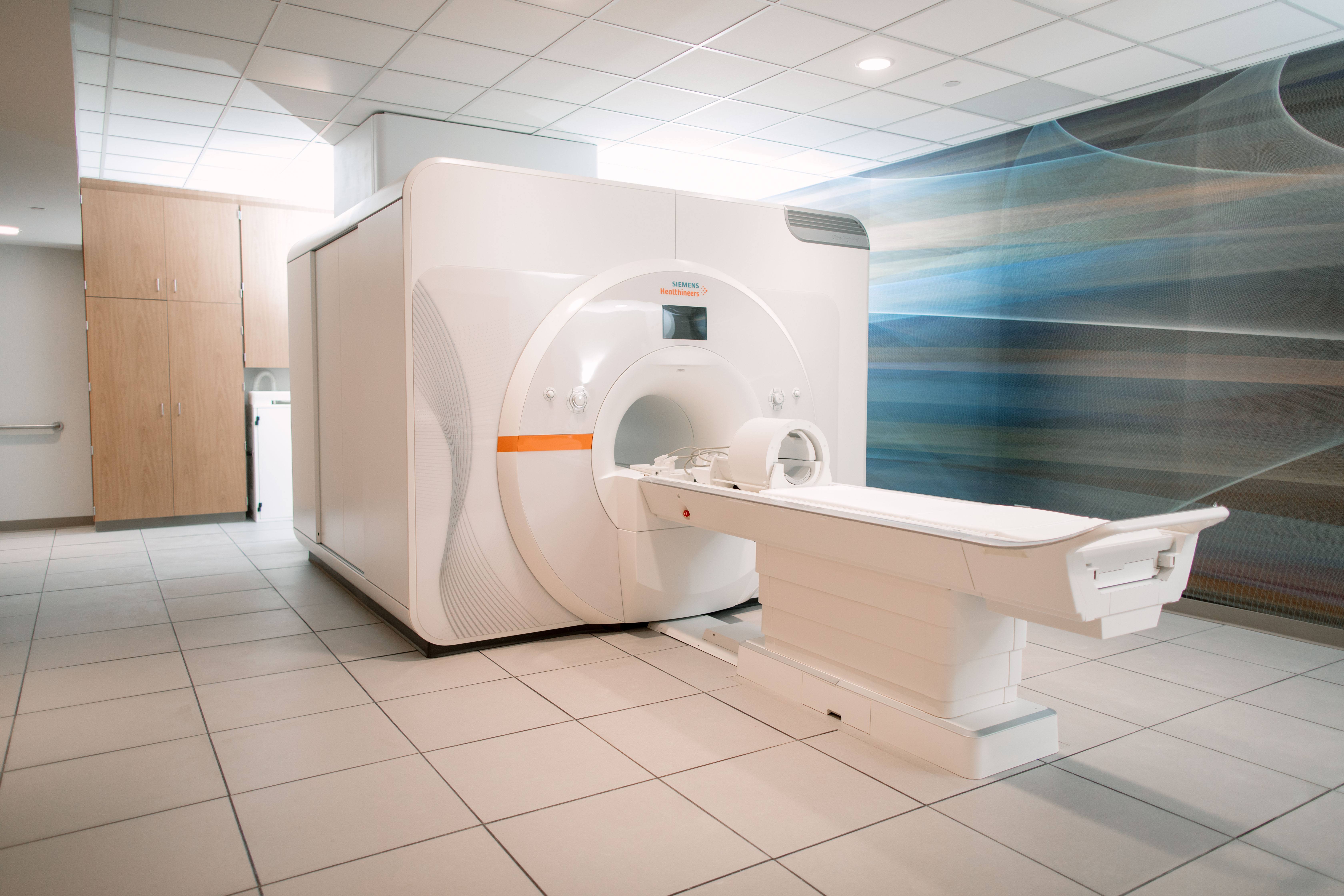-
Featured News
Science Saturday: Installing clinical 7-Tesla MRI scanner is a high-flying feat

The addition of a 7-Tesla MRI scanner — the first in North American with U.S. Food and Drug Administration (FDA) clearance for clinical uses — is a big deal for Mayo Clinic.
Mayo Clinic was thorough in its decision-making process when acquiring the scanner, and in planning the logistics of moving the system into the Charlton North Building on Mayo Clinic’s Rochester campus. The acquisition and planning process took months.
The morning of the installation, seven flatbed trucks rolled down Second Street Northwest, the first with the 7-Tesla MRI scanner and the others each loaded with two counterweights to be attached to the crane for balance.
https://www.youtube.com/watch?v=79WFA8TDDW8
It was a megasized Cirque du Soleil, with slow-motion aerial acrobatics choreographed to perfection. The crane lifted the weights and placed them on its backside before switching the lift supports and hefting the scanner from its flatbed. Next, moving the scanner slowly counterclockwise until it was positioned over a hole that had been cut in the roof, it was lowered into its new home before popping the roof cap back into place.
“The day when the magnet arrived was quite exciting,” says Andrew Fagan, Ph.D., a Mayo Clinic physicist. “It was a beautiful, clear, blue-sky day. The magnet arrived on the back of a truck, and we had a fairly large crane to lift it off the truck and swing it over the building and into the magnet room.
“It’s a much larger magnet, compared to existing scanners — about twice the weight of our largest existing scanner — so it was quite an engineering task to maneuver the scanner over the building and into the room itself.”
The magnet and scanner system, designed and built by Siemens Healthineers, is a new design that is the culmination of several years of work, including development, research and refinement — that allows for the scanner to fit within a typically sized scanner room in a hospital, Dr. Fagan says.
For the Department of Radiology, though, fit is more than just physical space. The 7-Tesla MRI system had to be consistent with Mayo Clinic’s mission to put patient needs first, and this checked that box — and more. The 7-Tesla MRI system is a necessary tool for a significant number of patients who do not have an answer to their health concerns.
“We believe that the 7-Tesla MR scanner provides us an incredibly transformational tool that will allow our physicians to provide exquisite diagnoses for our patients and allow them to have better care,” says Kent R. Thielen, M.D., department chair for Radiology on Mayo Clinic’s Rochester campus.

“Having the 7-Tesla scanner at Mayo Clinic is going to have a big impact for our physicians in the way they can care for their patients, because they will be able to offer a really unique service,” says says Kimberly K. Amrami, M.D., division chair of Musculoskeletal Radiology at Mayo Clinic. “If patients have a need for an MRI of the brain at 7-Tesla because what we want to see needs that field strength, they will be able to get that here as part of their clinical care. And that’s not true of anywhere else in North America.”
With its increased magnetic field strength, the scanner can noninvasively see deeper into the human body more clearly than before.
“This is an immense step forward for Radiology,” says Kirk M. Welker, M.D., a neuroradiologist at Mayo Clinic in Rochester. “The 7-Tesla MRI scanner is going to be phenomenal, because it provides us with a new set of eyes to look into the brain and other organs of the body, and see things that were previously invisible.”
The first patient is expected to be scanned in December. This milestone in Mayo Clinic’s history joins others before it, including the first clinical X-ray CT scanner in North America in 1973 and, more recently, the first FDA and Centers for Medicare & Medicaid Services approval for a positron emission tomography imaging agent to identify recurrent prostate cancer.
###
About Mayo Clinic
Mayo Clinic is a nonprofit organization committed to clinical practice, education and research, providing expert, comprehensive care to everyone who needs healing. For more information, visit mayoclinic.org/about-mayo-clinic or newsnetwork.mayoclinic.org.
MEDIA CONTACT:
Ethan Grove, Mayo Clinic Public Affairs, 507-284-5005, newsbureau@mayo.edu
_________________________________________________
Other Mayo Clinic medical research websites:







